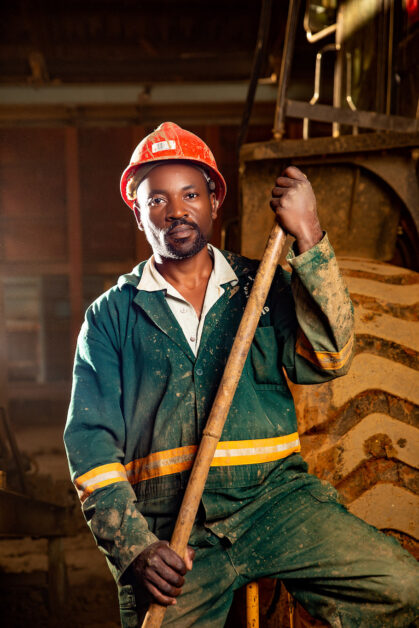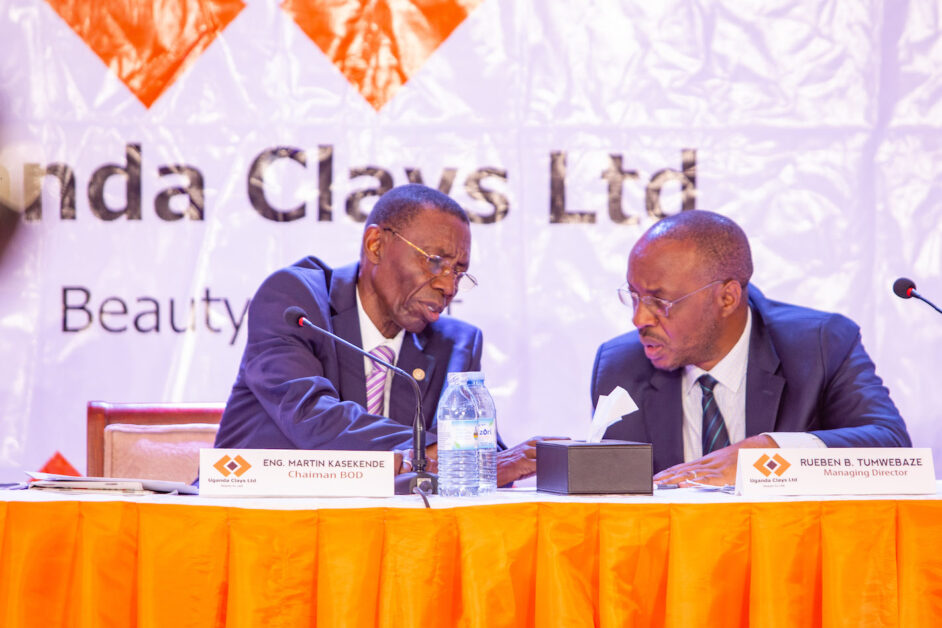2022⏤ the 4th year in the 5-year 2019-2023 Corporate Strategic Plan of Uganda Clays Limited (UCL), was by all means a tough year. Not only did Uganda’s oldest and largest clay building products maker’s revenue remain flat⏤ UGX36.6 billion, versus UGX36.7 billion in 2021, but this was UGX8.4 billion or 19% below the UGX45 billion target.
Due to an increase in the cost of sales by 12% to UGX 21.9 billion, from UGX 19.4 billion in 2021, profits also fell 2.5 times to UGX2.9 billion, from UGX5.9 billion the previous year. As a result, shareholders had to take home only UGX450 million in dividends, which is three times less than the UGX1.35 billion they shared the previous year.
But what should probably worry the shareholders more, is that 2022 performance-below-target, significantly affects the company’s ability to hit its 2023 target of UGX75 billion in gross revenue! That would mean having to more than double the 2022 performance, something that Reuben Tumwebaze, the company’s Managing Director, openly says is unrealistic.
“Our current capacity at both plants can deliver a maximum of UGX50 billion per year. So we will definitely not deliver the UGX72 billion,” he told CEO East Africa Magazine in an online interview.
He explains that the 2019-2023 Corporate Strategic Plan was premised on an aggressive expansion that didn’t happen and this was made worse by equipment and people challenges as well as the Covid-19 pandemic.
“Our Target for 2022 was UGX45 billion but we struggled with machine breakdowns due to very old equipment. The newest tile press a Kajjansi was manufactured in 1981. When fully loaded, to deliver the highest sales volume ever of UGX36 billion, the old equipment started failing seriously. The Kamonkoli factory (in Mbale) was also at its maximum but now it has been expanded by 20% and that is what helped us keep the stability,” intimates Reuben.

“As you are aware, profitability i.e. the bottoms was impacted by the sharp rise in input costs exacerbated by high fuel costs. The zero COVID policy in China affected logistics costs, and a dampened economy as well. Note that the top line remained more or less at UGX36 billion plus for 2021 and 2022 despite the same high costs,” he adds.
“At the time the Board commissioned this five-year plan, they had incorporated an aggressive expansion program in line with the economic growth.No sooner had this plan been commissioned in 2019 than the board and the entire ExCo fell vacant in March 2020 shortly before the COVID lockdown. This vacuum in top leadership for almost a year meant that strategic planning got paralysed to some extent because the Board was looking for a Managing Director, a box that was ticked off in December 2020. I reported on March 2021,” Reuben explains further.
“Of course, there was an acting Managing Director, but most of her effort and the board was spent in manoeuvring the COVID pandemic and how to stay resilient. She and her ExCo did an incredible job. The full substantive ExCo was finally constituted in May 2021,” he adds.
Reuben joined UCL from Uganda National Roads Authority (UNRA) where he was the Director of Road Infrastructure Protection. Prior to that, he held several Managerial positions at Lafarge Uganda, Hima Cement Ltd and Century Bottling Company (now Coca-Cola Beverages Uganda). The B. Sc (Mechanical Engineering) graduate from Makerere University, also holds an MBA from Edinburg Business School as well as ACCA certification.
Building a high-calibre team
Once he got to the job, his first assignment was putting together what he in his words describes as a “high calibre” team at the ExCo and the layer below.
“The main feature of this ExCo recruitment was to ensure we attract high-level talent with experience in manufacturing processes, data analytics and performance. The layer below the ExCo was also having serious gaps and we had to hybrid this level as well,” he says.
“A very experienced staff was largely driven by market conditions. We had to get top professionals to bend the curve of Uganda Clays. You can’t aspire to move from UGX30 billion sales revenue in 2019 to UGX72 billion in 2023 with the same mindset, the same expertise, the same machinery and similar approaches! It’s not possible. That aspiration of growing revenue by 2.5 times requires expunging old systems and mindsets and approaches and equipment. It’s indeed an aggressive approach,” he adds.

Moses Sanye, a mechanical engineer with over over 22 years in manufacturing systems, heavy equipment maintenance, major operations planning/ execution and change management was recruited from LaFarge Holcim (Hima Cement) to work as the General Manager for the Kamonkoli Plant. Prior to Hima Cement, Moses worked at Bujagali Energy Limited.
Joseph Ssendegeya was also brought in from LaFarge Holcim as the Head of Production. He holds an Advanced Diploma in Health and Safety Management, and a Bachelor of Environmental Engineering. Mark Rwomushana, was picked from IAA Healthcare to head the Sales and Marketing Function, while Patrick Mukasa was brought in from Kalangala Infrastructure Services as Head of Internal Audit.
Evah Natukunda was brought in from Coca-Cola Beverages Uganda to head procurement. She holds a Master’s degree in Supply Chain Management from Kyambogo University and a Bachelor’s of Statistics from Makerere University.
The above team would complement Jones Muhumuza who joined UCL from NSSF in March 2020 and was in September 2021 made Head of Finance as well as Francis Kintu (also ex-NSSF) who became the Head of Human Resources. Atuko Irene Otworot, a Chemical Scientist with over 9 years of experience and an M.Sc. in Chemistry holder, was promoted from Research and Development Officer to become the Quality Manager.
The high-calibre team didn’t come in cheap though. According to the company’s annual report, UCL’s expenses on key management costs nearly tripled⏤ from UGX803 million in 2021 to UGX2.1 billion in 2022.
Reuben is however happy to spend that much, for he believes there is value for money.
“The effect of this high-calibre staff has been immediate. For example, immediately sales revenue moved from UGX30billion 2019 to now UGX36billion so they have already covered their salaries. This increment is from the same old equipment and the same line staff on the shop floor,” he says.
Reuben adds that while Uganda Clays Ltd is highly gifted with the most talented shop-floor teams, they needed reinforcement at the middle and senior management level, to “mobilise them into high-performing teams and ensure that every member is involved in the process.”
“We had to immediately dismantle the old culture of the top-bottom to-round table approach where daily management of operations is through all teams having standing meetings in the morning and another meeting at 10 for key supervisors. We have production reports and incidents with so much detail coming in every two hours on WhatsApp and debates are alive,” he explains.
He adds that while such high-calibre professionals are an asset and whose real benefits are not immediate, in the case of UCL, there are already immediate and visible results.
“For example, we are now able to install and remodel our plants in-house without any external services. Our engineering services are full of top-notch, highly intelligent engineers. We expanded Kamonkoli in-house at a 10th of the cost, and we have installed two new state of art press machines this year in-house including designing operation software and automation as well as civil works. These are immediate results but in the long run, full benefits will be realised,” he reiterates.
A new UGX100 billion payload line and expanded clay deposits
He also says that other than boosting the people element, which has seen “completely new top leadership and 50% of senior professionals”, there is an expansion plan that among others includes a new state-of-the-art tile line at the Kajjansi main plant that was commissioned in 2021.
“Part of the equipment has been delivered and installation is in progress. This new line can deliver UGX100 billion per year in current economic conditions. Phase one will be commissioned in June 2024,” he says.

“The new line will deliver coloured products and more varieties and sizes of roofing sizes,” he adds.
To maximise output from the new line, the says that UCL has “acquired massive quarry reserves” that are pushing the company’s active quarry reserves from 30 to 50 years.
The company is also engaging the National Environmental Management Authority (NEMA) to ensure its natural resources uses are sustainable.
“ We have aggressive environmental practices aimed at saving our current and future generations and the environment. In collaboration with NEMA, through audits and training, we are assured of sustainability management,” he says.
The company is also fixing its route-to-market strategy to ensure easy access to its products.
“We have ensured the accessibility of our products across the country and now you can access our products in all cities and five divisions of Kampala through agents. We have ensured product affordability by partnering with SACCOs, and corporate customer programs and introduced hire purchase models,” he adds.
We asked him, if with all these changes in place, Ugandan Clays will be in a position to repay the historical debt owed to the National Social Security Fund (NSSF), also one of its shareholders.
“We are ready to pay the NSSF loan come 2025 and any other capital expenditure facility that we intend to procure from financing entities. I will tell you that UCL has been ready to pay for the last three years! We are looking forward to this glorious opportunity of paying off this loan. NSSF has been a very incredible partner not because they are the major shareholder but because of the strong belief at NSSF in the value proposition UCL offers. NSSF has maintained their faith that UCL is a great investment. We thank them for standing with us,” he concludes.
